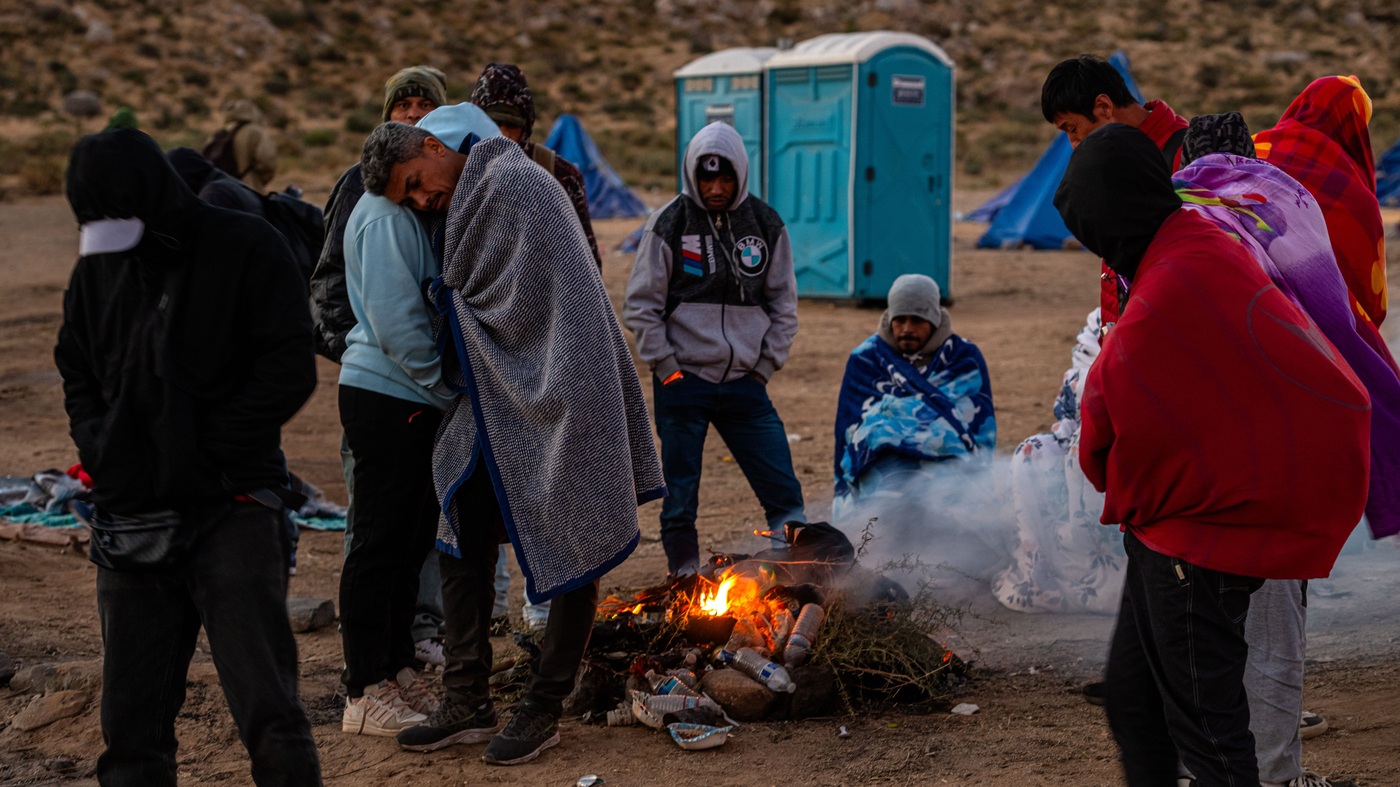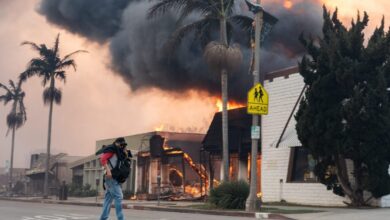Migrants being sent to unofficial camps in California’s desert : NPR

Locals say U.S. Border Patrol is delivering hundreds of migrants into a series of camps, one of which is on private property, in the border community of Jacumba in the Southern California desert. Overnight temperatures in the desert have begun to drop below freezing.
Ash Ponders for NPR
hide caption
toggle caption
Ash Ponders for NPR

Locals say U.S. Border Patrol is delivering hundreds of migrants into a series of camps, one of which is on private property, in the border community of Jacumba in the Southern California desert. Overnight temperatures in the desert have begun to drop below freezing.
Ash Ponders for NPR
JACUMBA, Calif. — On a chilly autumn morning in the California desert, on the side of a highway, two young men are asking for help.
They tell NPR they are from Turkey. They crossed the U.S.-Mexico border a few minutes ago, with about 18 other people.
They’re exhausted.
And then they ask for something unusual, given the circumstances.
“Please. Call border patrol.”
Almost as soon as they say it, Border Patrol rolls up and takes them.
As strange as it sounds, this is what they want. They have been told that if they cross over and turn themselves over to Border Patrol, they are taking the first step toward getting a visa or a better chance at asylum in the United States.

Two Kurdish migrants attempt to turn themselves in to U.S. Customs and Border Protection in Jacumba, Calif., on Nov. 11.
Ash Ponders for NPR
hide caption
toggle caption
Ash Ponders for NPR

Two Kurdish migrants attempt to turn themselves in to U.S. Customs and Border Protection in Jacumba, Calif., on Nov. 11.
Ash Ponders for NPR

A migrant who came from Honduras after receiving threats because of her sexuality rests in Jacumba, Calif., after a long walk to the U.S.
Ash Ponders for NPR
hide caption
toggle caption
Ash Ponders for NPR

A migrant who came from Honduras after receiving threats because of her sexuality rests in Jacumba, Calif., after a long walk to the U.S.
Ash Ponders for NPR

Migrants at the unofficial camps in Jacumba, Calif., say Border Patrol sometimes tells them to stay put for days while they await processing.
Ash Ponders for NPR
hide caption
toggle caption
Ash Ponders for NPR

Migrants at the unofficial camps in Jacumba, Calif., say Border Patrol sometimes tells them to stay put for days while they await processing.
Ash Ponders for NPR
This is how every day for the past few months, coyotes drop off over 300 migrants at a miles-long gap in the border wall in the Southern California desert. When the migrants cross it, they find themselves on the outskirts of the tiny community of Jacumba, population about 600. They end up at camps like this one, an open field near the highway, where Border Patrol has told them to wait. Activists and locals say it’s a humanitarian disaster. And they say no one is helping.
There is no shelter of any kind from the gusty wind or desert cold
The camps where the people are being taken by Border Patrol are a dystopian sight. At one of them, about 150 adults and children huddle together for warmth.
A Kurdish man, Ramazan Bicer, says he crossed over early this morning. He talks about government persecution and poverty in Turkey, where he’s from. He says his plan is to remain in the U.S. “My plan is just … get my green card and stay here all of my life. We will stay. We don’t have any other choice.”

Coyotes drop off migrants at a miles-long gap in the border wall in the Southern California desert, on the outskirts of Jacumba. One of the camps that has sprouted up is on private property.
Ash Ponders for NPR
hide caption
toggle caption
Ash Ponders for NPR

Coyotes drop off migrants at a miles-long gap in the border wall in the Southern California desert, on the outskirts of Jacumba. One of the camps that has sprouted up is on private property.
Ash Ponders for NPR

Ramazan Bicer pauses for a moment in Jacumba, Calif., earlier this month after a long journey from Turkey.
Ash Ponders for NPR
hide caption
toggle caption
Ash Ponders for NPR

Ramazan Bicer pauses for a moment in Jacumba, Calif., earlier this month after a long journey from Turkey.
Ash Ponders for NPR

Migrants say Border Patrol tells them that if they leave the camps, they will get deported.
Ash Ponders for NPR
hide caption
toggle caption
Ash Ponders for NPR

Migrants say Border Patrol tells them that if they leave the camps, they will get deported.
Ash Ponders for NPR
Most people in this camp on this morning are Kurdish. But there are also many from Latin America.
One woman from Honduras says she left home because she received threats for being gay. She breaks down crying: She hasn’t spoken to her family since she left a month ago. “I won’t tell them I made it,” she says, “until I’m out of here.”
Looking around at the makeshift tents that migrants have built with tarps, rocks and gathered wood, this looks like a refugee camp. One where someone might expect to see the Red Cross. The National Guard. Doctors Without Borders.
Migrants and volunteers told NPR that every single day, Border Patrol finds hundreds of people who have made their way through the gap, drops them off at these camps and tells them to stay put. They are told if they leave, they will get deported.
NPR has been reaching out to U.S. Customs and Border Protection for the past week. On Tuesday, after publication of this story, the agency emailed a statement saying in part that “CBP officers and agents prioritize the health and safety of all those they encounter by providing appropriate medical care and humanitarian assistance as needed and by routinely coordinating with emergency medical services to assist individuals in need. CBP prioritizes the most vulnerable migrant populations and transports them out of inclement weather to CBP processing facilities as quickly as possible.”
The agency did not respond to NPR’s specific questions concerning the Jacumba camps.
Locals say there is barely any oversight.
The only people coming here to help are locals and volunteers. This morning, they are handing out baby formula, first aid, water and food, when a Border Patrol truck shows up.

Dozens of volunteers based out of an old church youth center organize food and clothing supplies before heading out to the camps near Jacumba, Calif., on Nov. 11.
Ash Ponders for NPR
hide caption
toggle caption
Ash Ponders for NPR

Dozens of volunteers based out of an old church youth center organize food and clothing supplies before heading out to the camps near Jacumba, Calif., on Nov. 11.
Ash Ponders for NPR

Sandwiches on a table provided for the migrants.
Ash Ponders for NPR
hide caption
toggle caption
Ash Ponders for NPR

Sandwiches on a table provided for the migrants.
Ash Ponders for NPR

Locals say there is barely any oversight of the camps in Jacumba, Calif., and that the only people coming to help the migrants are community residents and volunteers.
Ash Ponders for NPR
hide caption
toggle caption
Ash Ponders for NPR

Locals say there is barely any oversight of the camps in Jacumba, Calif., and that the only people coming to help the migrants are community residents and volunteers.
Ash Ponders for NPR
On a loudspeaker, an agent tells families with children to line up.
The families are taken away in a van.
If they are like everyone else NPR spoke to, they think this is the first step toward getting legal status in the U.S.
Immigration lawyers told NPR that what’s likely to happen is that these people will be processed. Everyone here will be placed in removal proceedings. And because they crossed the U.S. border without permission, their chances of getting asylum are lower than if they had come in through an official port of entry.
In a few hours, another couple hundred migrants from somewhere else in the world will arrive in Jacumba.
It’s like a revolving door in the middle of the California desert
At a distance, an older man wearing a baseball cap watches the whole thing. His name is Jerry Schuster, and he owns this land.

Jaroslav “Jerry” Shuster stands for a portrait above Moon Camp, which largely rests on his private land just outside of Jacumba, Calif.
Ash Ponders for NPR
hide caption
toggle caption
Ash Ponders for NPR
“They’ll be here for three days, destroying my property,” he laments. “They’ll be gone, and I have to live with their destruction right here.”
Schuster is also an immigrant, from Yugoslavia. He bought this land some 40 years ago. Then a few months ago, he woke up to find it being used — without his permission — as a migrant camp, for people who are hungry, thirsty, sometimes wounded. There is a disgusting port-a-potty.
Those who stay overnight sometimes cut down trees for bonfires.
Sometimes people come knocking on his door. Once, he responded with gunshots.
Schuster says he’s spoken many times to Border Patrol, the police and the fire department.
He keeps getting told they can’t help him. He says he’s heartbroken. This ranch was his American dream. “Our government [is] just leaving us behind. American dream is gone. It’s not here no more. … That’s just a dream. That’s all that’s left. Just the dreams.”
Customs and Border Protection told NPR “private property law is the responsibility of state and local law enforcement organizations and not something that federal immigration officers have the authority to enforce.”
Locals left to provide assistance to the migrants
This sense of anxiety and dread is shared by many here in Jacumba. Even those who are going down to the camps as often as they can to offer humanitarian assistance.

U.S. Border Patrol agents usher hundreds of immigrants into a series of camps in Jacumba, which is near the U.S.-Mexico border.
Ash Ponders for NPR
hide caption
toggle caption
Ash Ponders for NPR

U.S. Border Patrol agents usher hundreds of immigrants into a series of camps in Jacumba, which is near the U.S.-Mexico border.
Ash Ponders for NPR

Immigration lawyers tell NPR that what’s likely to happen to the migrants is that they will be processed and then begin deportation proceedings.
Ash Ponders for NPR
hide caption
toggle caption
Ash Ponders for NPR

Immigration lawyers tell NPR that what’s likely to happen to the migrants is that they will be processed and then begin deportation proceedings.
Ash Ponders for NPR

On this day, U.S. Border Patrol tells families with children to line up. They are soon taken away in a van.
Ash Ponders for NPR
hide caption
toggle caption
Ash Ponders for NPR

On this day, U.S. Border Patrol tells families with children to line up. They are soon taken away in a van.
Ash Ponders for NPR
Winter is approaching, and they are worried that people will start dying.
Sitting on her porch, Karen Parker lights a cigarette and recounts what she’s seen in the last few months. “Scabies. Parasites. Necrotic scorpion bites. People have had seizures. Diabetic emergencies. Broken bones. Burns, lots of burns.”
Parker has lived in this area her whole life. She’s a retired social worker with first-aid training, and she goes down to the camps frequently. The children really get to her. “These are asylum seekers. They have every reason in the world to seek asylum on American soil. My grandmother came from Ireland. By herself. She was 12 years old. And if she hadn’t done that, my grandchildren wouldn’t exist, in America.”
She’s also angry that civilians like herself have been left to handle this alone, with no help from the government. “What the f— with them. I don’t know what else to say. They’re not taking any kind of responsibility or accountability. They need to let people in through the port of entry. They need to secure our border. I am for a secure border.”
When Karen and other volunteers step up to help at the camps, they sometimes get yelled at by other Jacumba residents. We meet one of those neighbors as volunteers load up food and first-aid supplies for the migrants to use at night.

Karen Parker rests on her porch in Boulevard, Calif., on a day off from volunteering at the camps in Jacumba. A retired social worker with first-aid training, Parker frequently goes down to the camps to treat migrants who need care.
Ash Ponders for NPR
hide caption
toggle caption
Ash Ponders for NPR
A woman in a pickup truck rolls up and starts shouting, “That food over there, is it for Americans? Or do you only help immigrants?”
She doesn’t give her name — she says it’s a small community and she could lose her job. But she says she’s upset about the situation down in the camps. “Nobody is doing nothing about it. Except, ‘Oh let’s help them out.’ “
The volunteers ignore her and drive to the camps.
By nightfall, the temperature has plummeted.
An entirely new group of migrants has arrived. About 60 people. This time, they’re mostly Chinese. There are also Ecuadorians and Guatemalans.
Huddling for warmth, they talk about what they are fleeing: repressive governments, cartel violence and poverty.
They seem unaware that just a few hours ago, another big group of people from other parts of the world sat in the same spot and had the same exact conversations.

Winter is approaching in Jacumba, and locals are worried that migrants will start dying as temperatures drop.
Ash Ponders for NPR
hide caption
toggle caption
Ash Ponders for NPR

Winter is approaching in Jacumba, and locals are worried that migrants will start dying as temperatures drop.
Ash Ponders for NPR
They think they are doing it the legal way, but in a few hours, many of them will get a date for a deportation hearing.
It feels eerily cyclical.
In the middle of the Southern California desert, the door keeps revolving.





